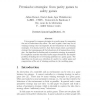Free Online Productivity Tools
i2Speak
i2Symbol
i2OCR
iTex2Img
iWeb2Print
iWeb2Shot
i2Type
iPdf2Split
iPdf2Merge
i2Bopomofo
i2Arabic
i2Style
i2Image
i2PDF
iLatex2Rtf
Sci2ools
121
click to vote
ITA
2002
2002
Permissive strategies: from parity games to safety games
It is proposed to compare strategies in a parity game by comparing the sets of behaviours they allow. For such a game, there may be no winning strategy that encompasses all the behaviours of all winning strategies. It is shown, however, that there always exists a permissive strategy that encompasses all the behaviours of all memoryless strategies. An algorithm for finding such a permissive strategy is presented. Its complexity matches currently known upper bounds for the simpler problem of finding the set of winning positions in a parity game. The algorithm can be seen as a reduction of a parity to a safety game and computation of the set of winning positions in the resulting game.
Related Content
| Added | 22 Dec 2010 |
| Updated | 22 Dec 2010 |
| Type | Journal |
| Year | 2002 |
| Where | ITA |
| Authors | Julien Bernet, David Janin, Igor Walukiewicz |
Comments (0)

